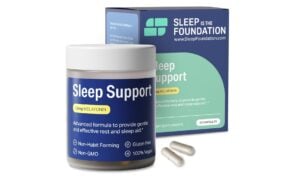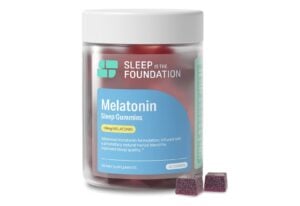Can You Overdose on Melatonin?
- A melatonin overdose, influenced by factors like age and timing, occurs after taking an excessive amount.
- Melatonin users should never consume more than the recommended amount, and be wary of inaccurate dosages on labels.
- Symptoms of an overdose include excessive sleepiness, stomach problems, and headaches.
- Consult a healthcare provider before taking melatonin or giving melatonin to children.
Melatonin has been found to be generally safe and to produce few serious side effects. In recent years, taking melatonin supplements has become five times more common among adults as it was twenty years ago. Over about the same time period, poison centers have received five times the number of calls about melatonin overdose. Emergency rooms have also seen four times as many children and infants coming in after unintentional melatonin ingestion.
It is important to be aware of the safety risks posed by taking too much melatonin. We take a closer look at melatonin dosing, potential symptoms of a melatonin overdose, and when to contact a doctor.
How Much Melatonin Is Safe to Take?
Recommended melatonin dosage varies depending on a person’s age. Experts generally recommend adults take between 1 and 5 mg of melatonin to promote better sleep. Talk to your doctor before beginning melatonin supplementation. Start with a low dose of melatonin to see how your body reacts, then gradually increase the dosage if needed. Small doses, such as 1 mg or less, may be just as effective as higher doses.
Starting with a low dose may be especially important, because some melatonin supplements contain a higher dose than what is listed on the label. In the U.S., dietary supplements are not tested by the government for safety or accuracy prior to being sold. It is also important to note that different formulations of melatonin, such as pill, powder, gummy, or liquid, may be absorbed differently by the body.
Symptoms of a Melatonin Overdose
A life-threatening melatonin overdose is rare, especially in adults. But melatonin supplements with higher doses can cause adverse reactions and side effects.
- Nightmares
- Headaches
- Irritability
- Stomach pain
- Nausea
- Daytime tiredness
- Dizziness
- Short-term depression symptoms
Drug overdose symptoms that require immediate emergency medical attention include difficulty breathing, seizures, or a loss of consciousness.
What To Do If You’re Experiencing Melatonin Overdose Symptoms
If you suspect you or someone else is experiencing a melatonin overdose, contact a poison control center. You can talk to a poison expert at PoisonHelp.org or by calling (800) 222-1222 in the U.S.
If you or someone else is experiencing severe symptoms, such as difficulty breathing, seizures, or a loss of consciousness, immediately call 9-1-1 or go to the emergency room. Ingesting melatonin may be particularly dangerous if you’ve consumed other medications or alcohol.
The safety and efficacy of supplements is not closely monitored by the U.S. Food and Drug Administration (FDA). Shoppers should take additional measures to make sure they are purchasing reputable products.
Long-Term Effects of Taking Melatonin
Melatonin has only been studied for short-term use, so it’s unknown how safe the supplement is when used long term. Most studies have only followed people using melatonin for about a month. Although longer-term studies haven’t found serious adverse events from using melatonin, experts say there isn’t enough research available to conclude that long-term use of melatonin is safe.
Is Melatonin Safe for Children?
Melatonin supplements are sometimes used to treat children who have insomnia, other sleep disorders, or neurodevelopmental disorders, like autism, attention-deficit hyperactivity disorder (ADHD), or epilepsy. The safety of melatonin in children likely depends on the child’s age and the dosage given. Lower doses are thought to be safer and more effective than higher doses.
Even though melatonin is available without a prescription in the U.S. and is also marketed toward children, you should not give melatonin to a child without discussing it with their doctor first.
When Should I Talk With a Doctor?
Although melatonin has largely been found to be safe, talk to your doctor before beginning to take it or any dietary supplement. People often assume dietary supplements are safe, but they are not tested by the Food and Drug Administration (FDA) for quality or accuracy, like prescription drugs are. Supplements may also cause side effects or interact with prescription drugs.
If you’re taking melatonin and experience serious side effects or are concerned about overdose, contact a poison control center or seek emergency medical attention immediately.
Medical Disclaimer: The content on this page should not be taken as medical advice or used as a recommendation for any specific treatment or medication. Always consult your doctor before taking a new medication or changing your current treatment.
References
8 Sources
-
Li, J., Somers, V. K., Xu, H., Lopez-Jimenez, F., & Covassin, N. (2022). Trends in Use of Melatonin Supplements Among US Adults, 1999-2018. JAMA, 327(5), 483–485.
https://jamanetwork.com/journals/jama/fullarticle/2788539 -
Freeman, D., Lind, J., Weidle, D., et al. Centers for Disease Control and Prevention. (2024, March 7). Emergency Department Visits for Unsupervised Pediatric Melatonin Ingestion – United States, 2019-2022. Morbidity and Mortality Weekly Report. Centers for Disease Control and Prevention.
https://www.cdc.gov/mmwr/volumes/73/wr/pdfs/mm7309a5-H.pdf -
Neubauer, D. (2024, March). Pharmacotherapy for insomnia in adults. In R. Benca, J. Elmore, & A. Eichler (Ed.). UpToDate.
https://www.uptodate.com/contents/pharmacotherapy-for-insomnia-in-adults -
Cohen, P. A., Avula, B., Wang, Y. H., Katragunta, K., & Khan, I. (2023). Quantity of Melatonin and CBD in Melatonin Gummies Sold in the US. JAMA, 329(16), 1401–1402.
https://pubmed.ncbi.nlm.nih.gov/37097362/ -
Savage, R., Zafar, N., Yohannan, S., & Miller, J. (2022, August 8). Melatonin. StatPearls.
https://www.ncbi.nlm.nih.gov/books/NBK534823/ -
Tuft, C., Matar, E., Menczel Schrire, Z., Grunstein, R. R., Yee, B. J., & Hoyos, C. M. (2023). Current Insights into the Risks of Using Melatonin as a Treatment for Sleep Disorders in Older Adults. Clinical interventions in aging, 18, 49–59.
https://pubmed.ncbi.nlm.nih.gov/36660543/ -
Besag, F. M. C., Vasey, M. J., Lao, K. S. J., & Wong, I. C. K. (2019). Adverse Events Associated with Melatonin for the Treatment of Primary or Secondary Sleep Disorders: A Systematic Review. CNS drugs, 33(12), 1167–1186.
https://pubmed.ncbi.nlm.nih.gov/31722088/ -
Shenoy, P., Etcheverry, A., Ia, J., WItmans, M., & Tablizo, M. (2024, March 9). Melatonin Use in Pediatrics: A Clinical Review of Indications, Multisystem Effects, and Toxicity. Children, 11, 323.
https://www.mdpi.com/2227-9067/11/3/323

















